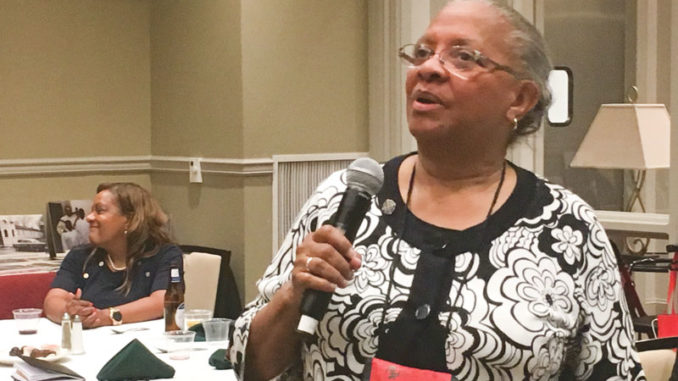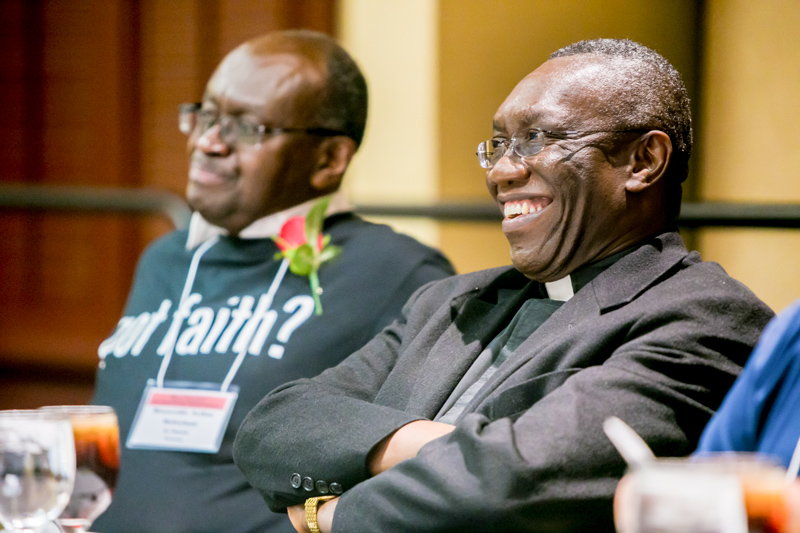
CHARLESTON—Some of the top Catholic theologians in the United States visited Charleston Oct. 10-13 for four days of fellowship, reflection, prayer and worship.
It was the first time in its 41-year history that the Black Catholic Theological Symposium held its annual meeting in South Carolina.
The Chicago-based organization was founded in 1978 to promote and support the research of black Catholic scholars and develop programs to respond to needs of black Catholics around the nation.
The meeting was organized by Kathleen Merritt, director of the diocesan Office of Ethnic Ministries, and Matthew Cressler, an assistant professor in the Department of Religion at the College of Charleston.
During the four-day event, 25 theologians met at the diocesan conference center on Orange Grove Road to listen to presentations of academic papers and hold discussions.
Kimberly Lymore of the Catholic Theological Union in Chicago said the annual meeting is an important chance for theologians to meet for intellectual and spiritual support.
“We are all spread out across the country and we don’t get a chance to be together very often,” she said. “This is an important chance for … fellowship and a chance to hear each other’s ideas.”
Lymore, like many of the participants, said she uses her theological background in a variety of ways. She is involved in parish ministry at St. Sabina Church in Chicago and directs the Augustus Tolton Scholars Program at CTU, which offers classes for lay leaders in Chicago.
Other attendees described lives that mix time in the classroom with work at the parish and community level. Redemptorist Father Maurice Nutt, who leads the institute for Black Catholic Studies at Xavier University in New Orleans, recently wrote a book, “Thea Bowman: In My Own Words,” about the Franciscan sister whose cause for sainthood was endorsed by the USCCB in 2018. C. Vanessa White, an assistant professor at Catholic Theological Union, is also an author and retreat leader. Sister Addie L. Walker of the School Sisters of Notre Dame combines her work at the Oblate School of Theology in San Antonio with offering retreats and formation classes for members of religious congregations around the country.
While in Charleston, the group paid an emotional visit to Emanuel AME Church, where nine people were killed while participating in Bible study in 2015, shot by a gunman who avowed white supremacist ideas.
The theologians toured the church, met with the current pastor and took part in a prayer service there.
They were also able to learn about the history and experience of black Catholics in Charleston through an Oct. 12 tour led by Arthur C. McFarland, a retired municipal judge and member of St. Patrick Church who has been active in the city’s community for many years.
The theologians also shared their perspectives at two public events.
On Oct. 10, SimonMary Aihiokhai, Ph.D., professor of theology at the University of Portland, presented a paper at the College of Charleston. The topic was “Christian Forgiveness as Incarnational: Turning to the Black Existential Experience in an Era of Hate.”
Aihiokhai said learning about the history of persecution and racism in the United States allows Christians as a whole to learn more about the suffering that Jesus experienced through his crucifixion.
Reflecting on this suffering, he said, can help us realize that Christ’s death and resurrection was the ultimate evidence of God’s forgiveness for a sinful world.
“Christian forgiveness points to, and is saturated with, a vision of hope,” Aihiokhai said. “Why would God want to forgive sinful humanity? It is because God invites humans to embrace the context of hope for a new way of being human. Why do we forgive those who offend us? It is because we believe that a different way of being human is possible for all of us.”
On Oct. 11, the theologians met with members of several historically black parishes to learn about their community experiences and hear their ideas and concerns.
The meeting drew members of St. Patrick Church in Charleston, St. James the Greater Mission in Walterboro, and St. Martin de Porres Church in Columbia.
Participants asked the theologians for suggestions on how to incorporate more elements of black Catholic heritage into the liturgy and how to reach out to family members and friends who have left the Church. The groups also discussed ways to get more young people involved in the Church as a whole.
The meeting concluded on Oct. 12 with Mass at St. Patrick.


